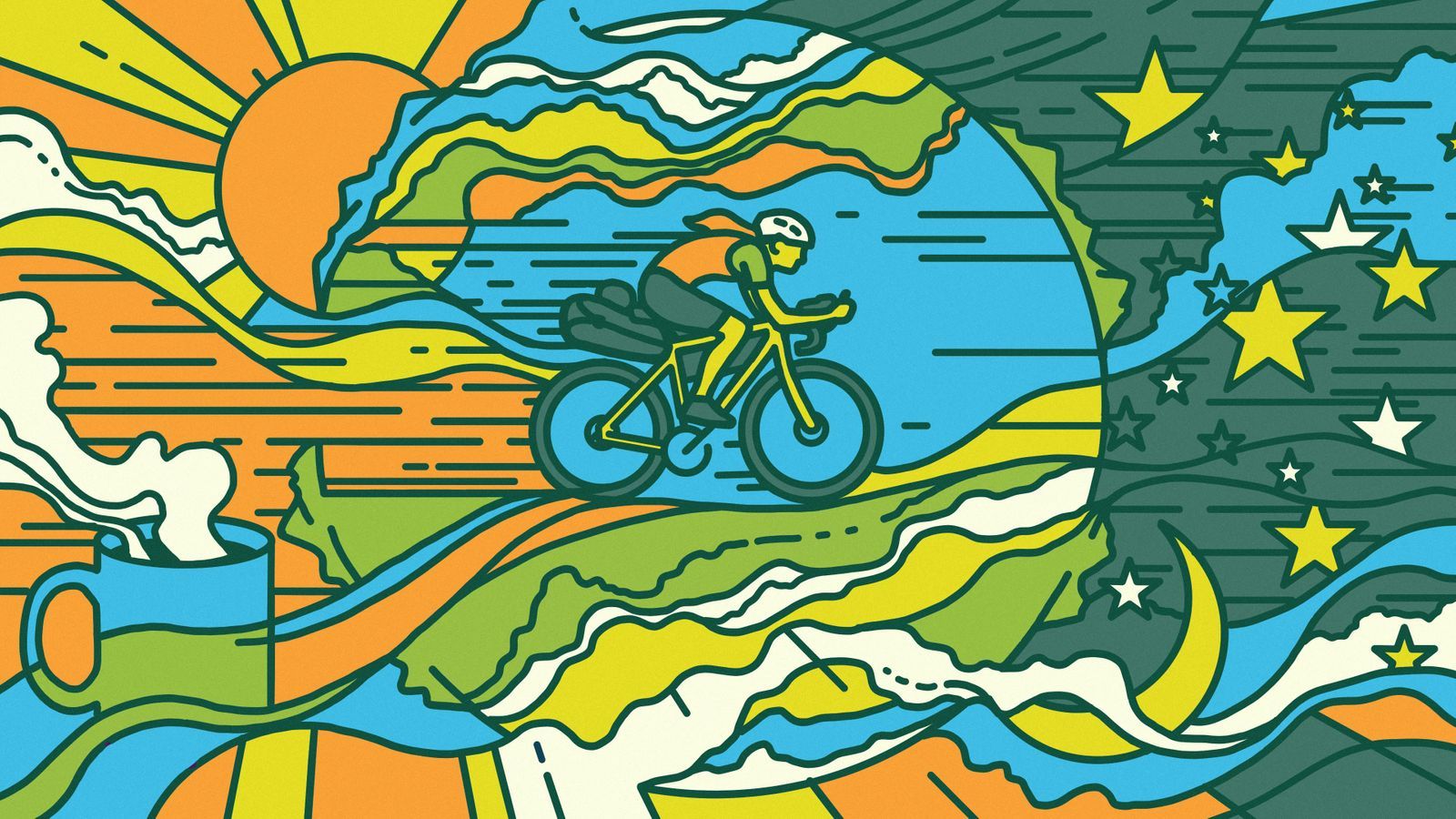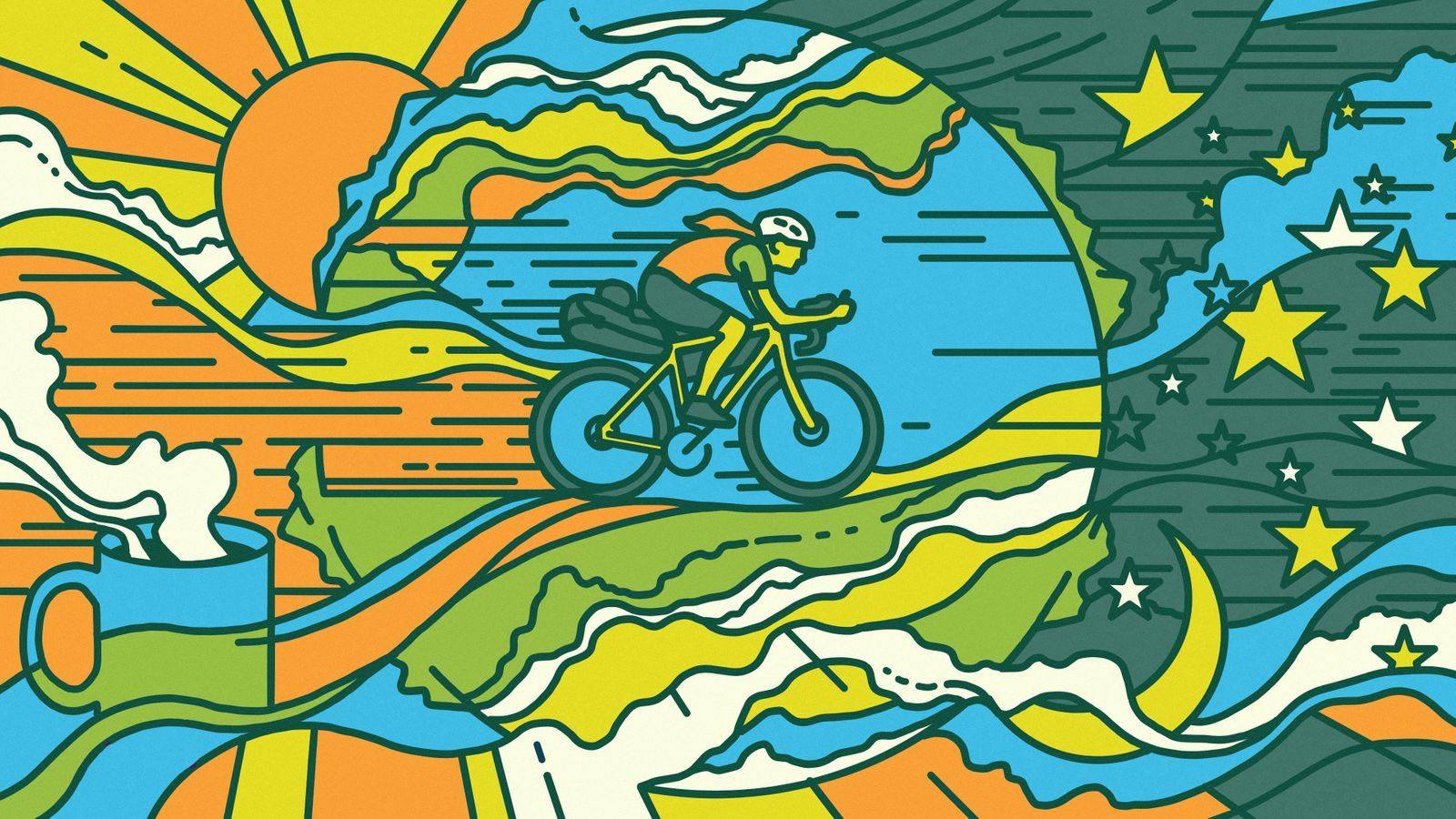
There is, perhaps, no one on our planet who can make sleeping inside a pipe sound quite as appealing as Jenny Graham, the fastest woman to ever cycle around the world.
“That was the beauty of the trip,” she says. “Being able to pull into somewhere, you might find that the only place available was a five-star hotel with a jacuzzi in your room, then the next night you’d be sleeping under a bridge or in a shed. When I was crossing Asia, it was summertime, and the weather was brilliant. You would always aim to get to a hotel or an inside space, but if that didn’t work out, I would find a pipe under the road and set up my bivvy, with my bike there beside me, looking out at the stars and watching the moon as I fell asleep.”
Graham’s unsupported, 18,428-mile (29,637km) cycle took her 124 days, 10 hours and 49 minutes.
I did an 800km race where I slept for two minutes. I was woken up by the sound of another cyclist...
Only a couple of sleep spots stood out as “particularly grim”. Jenny laughs: “I became a bit of a toilet block connoisseur. I had been out for four nights in Australia, sleeping in bus shelters, with storms every day. I wasn’t drying off and the only shelter I could find one night was this disgusting toilet block. There was faeces on the wall and rubbish all around it. It was such a low moment, but I was just desperate to put my head down and not be out in the storm.”
I’ve called Jenny to ask how sleep impacted her during her ride. Did she feel better on the bike after a good night’s sleep? “Big time,” she says. “It's funny, because I never, ever noticed that I felt strong and fit after a good sleep, but I always noticed how worn down I felt after a bad sleep.
“The whole of the round-the-world trip was about riding and resting. It was about being strong enough to get up and go again the next day. Particularly if I had multiple nights out - anything more than two in a row out in rough weather - I could really, really feel myself slowing down.

“I was fairly consistent on the bike, but it got harder to get up and go after coffee stops. It was off-the-bike time which would increase. That fatigue, after so many months on the bike; on four or five hours sleep - and often not even good sleep - can make decision making really tough.”
Just how important is a good night’s sleep if you’re heading out on an adventure?
We spoke to two athletes who have experienced serious sleep deprivation in high-performance circumstances - the globe-trotting Jenny Graham and ultra-endurance coach and athlete Robbie Britton, who holds the British record for the longest distance run in 24 hours (172 miles/277km). Then we called a sleep expert, Kipmate founder James Wilson, to try and make some sense of it all.
Ring the alarm
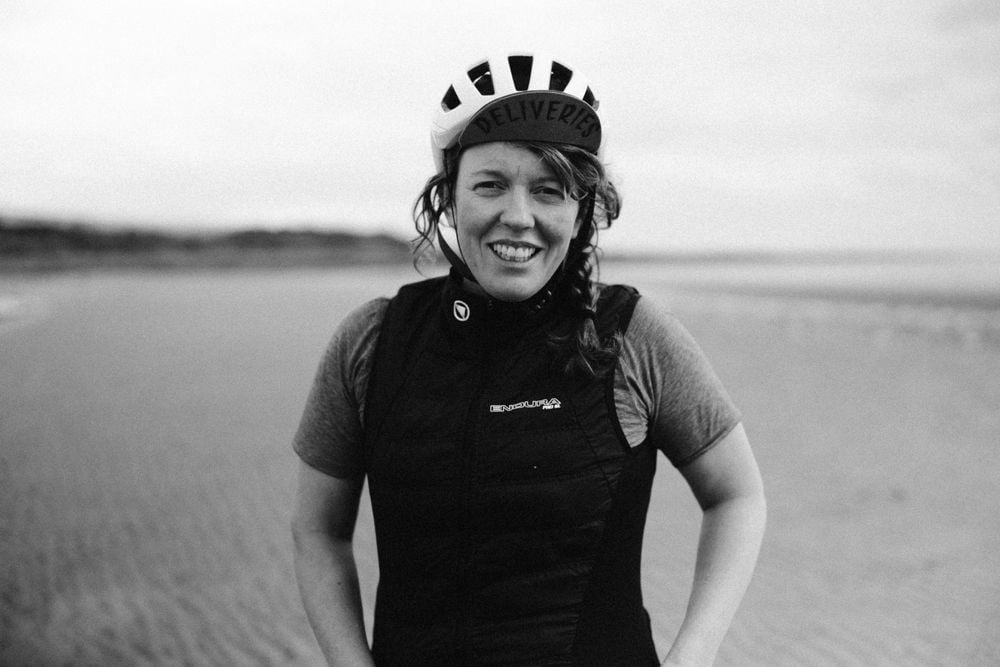
James Wilson is, thankfully, not a fan of the 5am club.
“If you’re a bit of an owl, getting up that early to train, I’d argue the recovery you get from sleep is more important than any training you could ever do," he says. "There are four things we need to live: food, water, air and sleep. If you didn't exercise for 10 days you'd be fine. If you didn't sleep for 10 days you'd be dead. Let's put the right emphasis on the right part of our wellbeing.”
Anecdotally, it feels like people are struggling to sleep more than ever. Sleep apps like Calm are booming, allowing you to drift off to the dulcet tones of Harry Styles whispering into your ear over gentle piano. ASMR sleep aid videos are racking up millions of views on YouTube. Every podcast seems to be sponsored by a mattress company. Everyone just seems to be shattered.

A 2022 study from Direct Line found that 71% of UK citizens don’t get the recommended 7-9 hours of sleep per night, and almost 23 million people (44% of the UK adult population) are experiencing symptoms of insomnia - having trouble getting to sleep or staying asleep.
“I wouldn’t say people sleep worse now than 20 years ago, but we understand sleep better,” says James Wilson, also known as The Sleep Geek. “There’s more awareness now. People blame modern life, but life has always been hard. I read in an article a while back that said in 1942 only 8% of people had sleep problems, but in 1942 most of the country was being bombed - so they probably had other things to think about than answering a questionnaire on sleep.”
James doesn’t blame phones - “we’ve always blamed advances in technology for poor sleep” - but rather looks at the wider issue holistically.
Sleep is about feeling emotionally and physically secure. When we're stressed and anxious, we produce cortisol, which is a wake up hormone connected to survival.
“We often skip a stage,” says Wilson. “You might say you’re not sleeping well, so you go onto Headspace or try CBD or buy a new mattress. Start at the start. What is it that’s stopping you from sleeping? Is it poor sleep posture? Is it a sleep disorder, like sleep apnea? Is it chronic insomnia, or are you stressed? Sleep is very much about feeling emotionally and physically secure.
"When we're stressed and anxious, we produce cortisol, which is a wake up hormone connected to survival. Your body is not going to let you sleep while you're being chased by a sabre-tooth tiger. Should you listen to something to change your mindset? Rather than creating that sense of fear that you have to get up in four hours, you can tell yourself a different story.”
This sense of safety was key for Graham when she was riding around the world.
“I’m not the world's fastest bike rider,” Graham says. It’s a casual turn of phrase which, of course, in this case, is not entirely true. “But I've got that resilience to be able to put my head down anywhere, accept where I am and not worry too much about it. I didn't realise until after the trip what a benefit that was. I had no idea where I was going to end up each day but it didn't freak me out.

“I had faith that I was carrying enough stuff to keep me warm and sheltered to survive the night. If I didn't find anywhere then I would just keep on riding. Mentally, that helps, if you've got that mindset that you're not stressed. I can fall asleep and be grateful for it almost anywhere.”
Sleep on it
There are several reasons why sleep is so important - and so crucial for high performance. “Sleep is your recovery time,” James says. “In sport, nutrition and sleep are your recovery tools.”
Different sleep stages have different impacts on our mental and physical state.
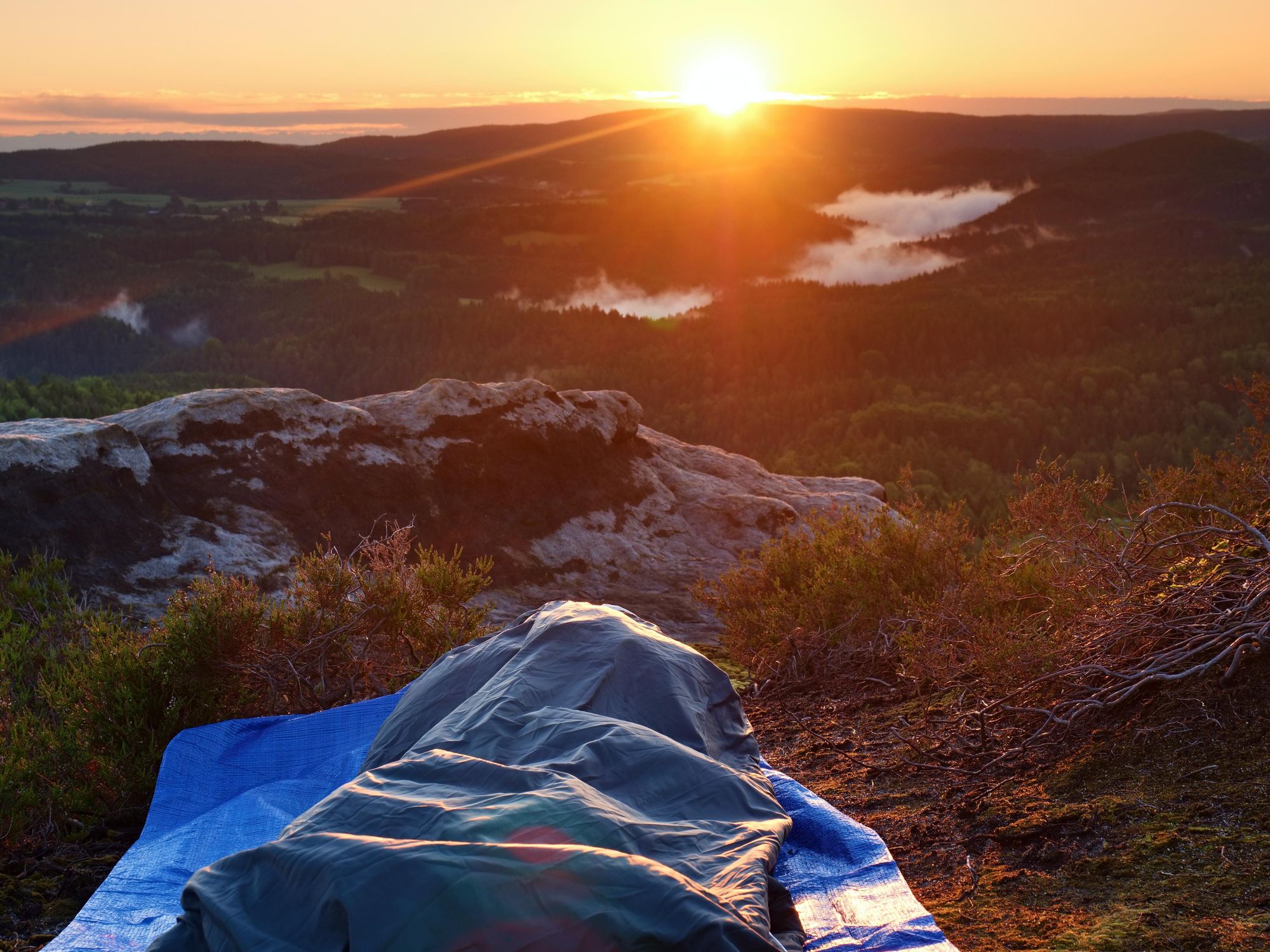
“There are four stages; REM sleep - rapid eye movement sleep - then NREM1, NREM 2 and NREM 3, which is also known as slow wave sleep or deep sleep.
“Deep sleep, when the growth hormone is released, is when we physically recover. It happens earlier in the night, during the period when it’s harder to rouse you. During REM sleep you’re more rousable. It’s where we consolidate memories. You also go through emotional relief; like an overnight counselling session. An important part of REM sleep is working through emotions that you’ve gone through during the day. That’s very important to our mental state.
“From a sports point of view, you might be more prone to injuries if you don’t have enough deep sleep, and we often struggle to manage our emotions when we’ve not had enough REM sleep.”
It's recovery, mentally and physically, and it allows you to be the best version of yourself. That’s not just in sport, it's any personal or professional situation.
These benefits get better the more we meet our sleep needs, in terms of how much, but also how good. "When you don't meet your need, your body wants to give you better sleep the next night," says Wilson. "Our bodies are desperately trying to give you the sleep you need, so the best thing for a good nights sleep tonight, is a bad one last night, as long as we an feel secure and turn our brains off a bit.
So sleeping for six hours isn’t twice as good as sleeping for three; it’s exponentially better.
“For athletes, in that moment in any sport where you have to make a difficult decision - if you’re a long-distance runner thinking about when you’re going to move, or you’re a footballer looking for your next pass - you’ll make those decisions better if you’ve slept better.
“It's recovery, mentally and physically, and it allows you to be the best version of yourself. That’s not just in sport, it's any personal or professional situation - but particularly for any athletes, when did you perform amazingly and sleep poorly?”
This is a question Robbie Britton is particularly well placed to answer.
Two-Minute Warning
It’s fair to say that Robbie Britton enjoys a challenge. “I just love going to the deepest, darkest wells of physical and psychological feeling,” he laughs, “and then seeing if I can keep going.”
Britton is no stranger to sleep deprivation. “Churchyards are very popular” for a quick mid-race micro sleep, he says. “Bushes. Ditches. I love a bus stop for a kip.”
Britton’s book 1001 Running Tips has a section on sleep deprivation. “A lot of us have sleep deprivation in other walks of life that we learn to cope with,” he tells me. “And we pick up coping strategies. That might be a young family with a kid, a nurse who works nights, an ex-raver. It’s a practical skill, and you work it out.

“I did an 800km race, the Race Across Italy, where I slept for two minutes. I was woken up by the sound of another cyclist. I had a can of Coke and then I went all the way to the finish off that. This was after 25-26 hours.” His final time was 32:54. “The last few hours felt like my strongest, but I had a good ‘why’ - racing a friend - and if I'm getting close to sunrise, that'll give me a boost to how my body feels.”
Natural light makes a big difference, Wilson agrees. “It’s key. As you wake up you want sleep hormones like melatonin down and wake up hormones like cortisol up; and light does that.”
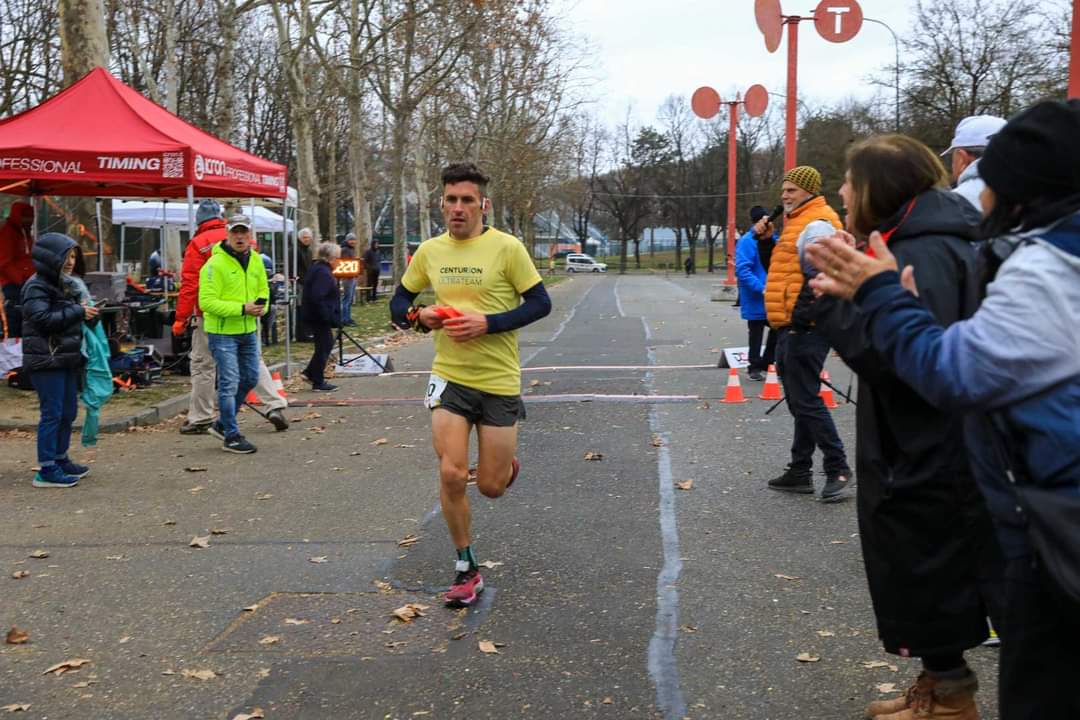
Robbie continues: “I’ll go until I need to sleep - when adenosine is built up to the top, you’re saturated, and the only way to dissipate that is to sleep. You can’t get rid of it with caffeine.”
Adenosine is a byproduct of cellular metabolism. The more active you are, the more adenosine builds up. This stimulates adenosine receptors, which in turn, promote sleep. During sleep, adenosine levels are reduced in the brain - but until you do, sleep pressure will slowly build.
“If you work too hard, it builds up quicker,” Robbie explains. “If you sleep for three hours, a good chunk will come out and if you’re well paced and well-fuelled, you can get through to the next day. With a two-minute sleep; I’m talking about clearing the minimum amount, so that I can crack on.”
With a two-minute sleep; I’m talking about clearing the minimum amount, so that I can crack on.
Wilson isn’t so convinced that this level of sleep could make an impact. “I’ve not experienced it as they have, but at two minutes, you’ve not had enough time,” he says. “That’s placebo.”
Placebo is a powerful tool, though. Whether these bitesize naps work or not, many ultra-endurance athletes swear by them; but Britton also very much believes in the power of a proper sleep.
“There was a 1000km race around Slovenia,” Robbie continues. “They had a checkpoint in the middle of the race where they had a bed. I got there with a 90-minute lead and around midnight - 24-hours in - and I took a 90-minute sleep. The entire lead went, the other guys got to me, then I shot off again. I knew the second half was hillier, which suited me.” Britton won the race.
“That was a tactical sleep,” he continues. “I cycled to the finish from there - with one more two-minute sleep at a bus stop which got me through. I remember getting paranoid about bears that night, though, which I probably wouldn’t have been if I wasn’t sleep deprived.”
These 90-minute sleep cycles have a lot science behind them.
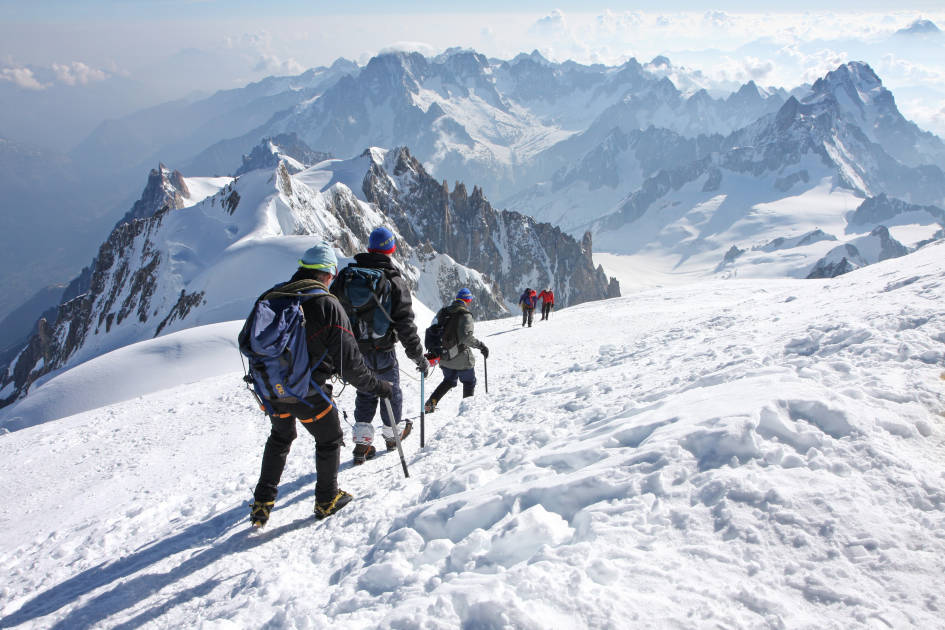
“A sleep cycle is different to a sleep stage,” Wilson says. “You have 90 minute cycles. So you come out of sleep about three to six times a night.” But if all goes to plan, you won’t remember this. “In 90 minutes, you go through that first cycle, and most of that cycle will be deep sleep. If you sleep for an hour, you could interrupt that, and you’ll wake up feeling really groggy.
“Of course, each cycle might be a bit different. You might need to sleep for 95 or 100 minutes. You need to be a bit more nuanced with it, but that would provide some physical recovery - though I would stress that there is no normal place in your life where you should be [using these sleep patterns], unless maybe you’re an A&E doctor or you’re in a war zone.” Or indeed, an endurance race.
Robbie continues. “For one night, you don't need sleep. It doesn't help in terms of performance. After two nights, you're on the cusp, and then it depends on how you manage yourself.”
***
Jenny Graham, whose book about her round-the-world trip is titled Coffee First Then the World, is - perhaps unsurprisingly - addicted to coffee.
“I love coffee and the effect that is has on me for waking up,” she says. “On the cycle around the world there were so few luxuries. You couldn't carry anything that wasn't a necessity. I was wearing the same clothes for four months. I had no other shoes with me; there was just nothing that you would call a luxury item other than just being there. There was nothing above and beyond what you needed, so coffee for me was that morning comfort blanket. 'If I just get out of this situation now, I can go and sit with a coffee'. I'm still as addicted as ever.”
Caffeine, structurally, looks similar to adenosine. The reason that it keeps you alert and awake is that it blocks adenosine receptors. “It changes your perception of effort as well, so it makes it feel a little bit easier, but there's only so much caffeine can do,” says Robbie.
Sleep deprivation doesn't care how long you've been running or cycling. It cares how long you've been awake.
“You can't just keep loading it into your system because of overload and potential side effects.”
One tactic some athletes use mid-race is a caffeine hit just before a nap, as caffeine takes around 30 minutes to metabolise. The practice has been delightfully dubbed a nappuccino. “It's not a super solution and it won’t solve your sleep deprivation problems,” says Robbie. “It can make parts feel easier, but when you need sleep, the only thing that will help you is sleep.”
Britton focuses on the start time of a race when deciding his sleep strategy.
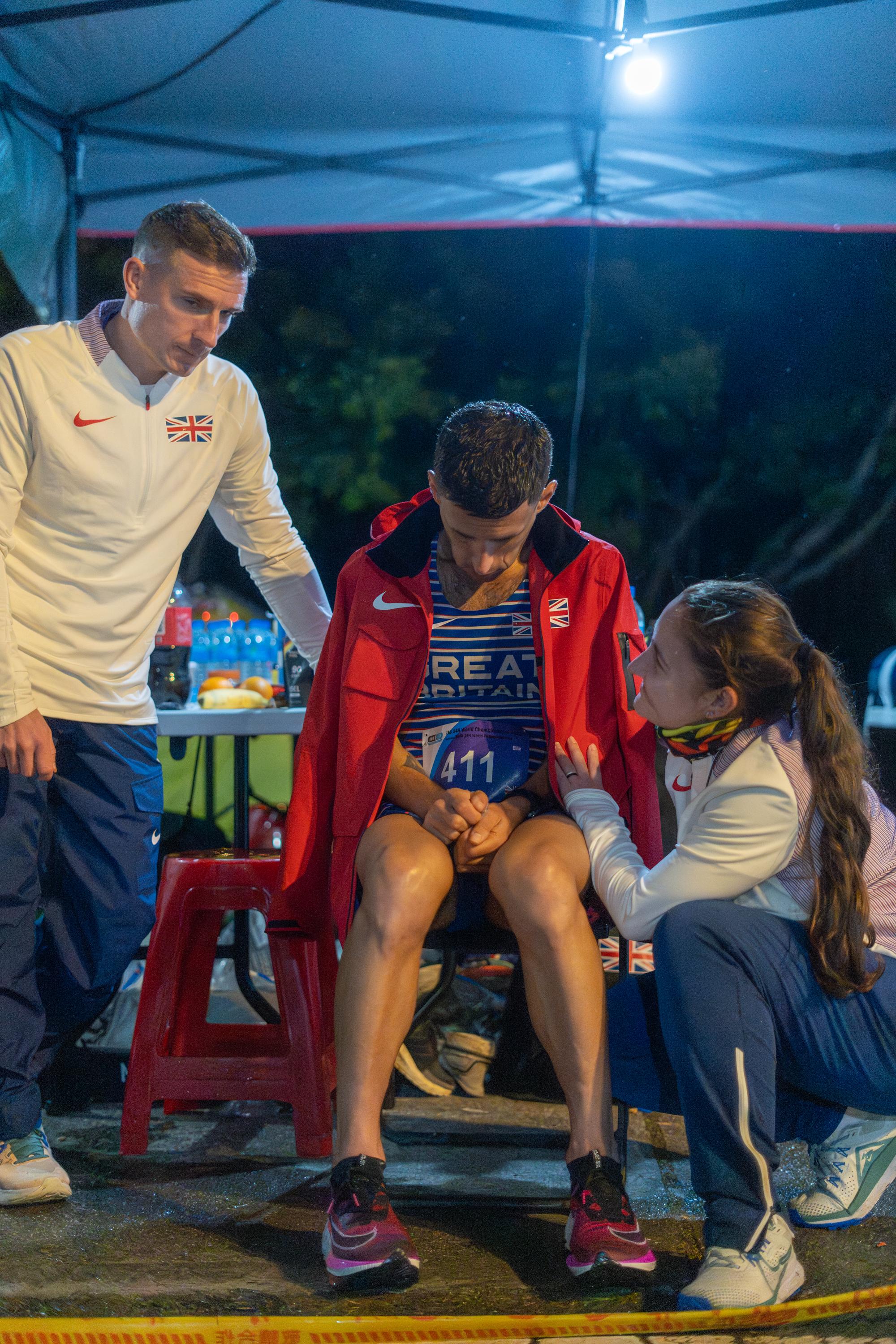
“It's very common now to have night starts in bike racing, because of the ease of getting out of the city in large groups. At a midnight start, everybody is immediately going to be sleep deprived. Sleep deprivation doesn't care how long you've been running or cycling. It cares how long you've been awake. I try to do a 90-minute sleep before a midnight start, and I pretend that it's morning. I have my breakfast and my coffee and I go through the motions as though I've had an eight hour sleep. But it's very hard to sleep for 90 minutes before a race starts.”
Some athletes try to maximise their sleep hours before a big event. “That can work,” says Robbie. “I’ll try to bank sleep the week before a race and reduce stress as much as possible.”
If you cry at dropping a tiny bit of a Kit Kat or missing a turn and slowing yourself by 10 seconds, you're probably sleep deprived.
I’m intrigued how an athlete like Britton knows when to sleep during a race. How do you differentiate that tiredness from an energy bonk? “It’s often a combination of all of it,” he says.
“As a sleep deprived person, though, you’re less likely to notice that. You might notice your reaction time lowering, and that's a good time to get off the bike and take yourself out of a dangerous situation. Especially if you're riding on open road. If you're weaving, running or cycling, then that's a good sign of it. You might slow, and it feels like you're stuck in first gear.
“On the bike you can look for poor decision making. Or getting upset at things, and everything being over-dramatised. If you cry at dropping a tiny bit of a Kit Kat or missing a turn and slowing yourself by 10 seconds, you're probably sleep deprived to an extent where it's an issue.”
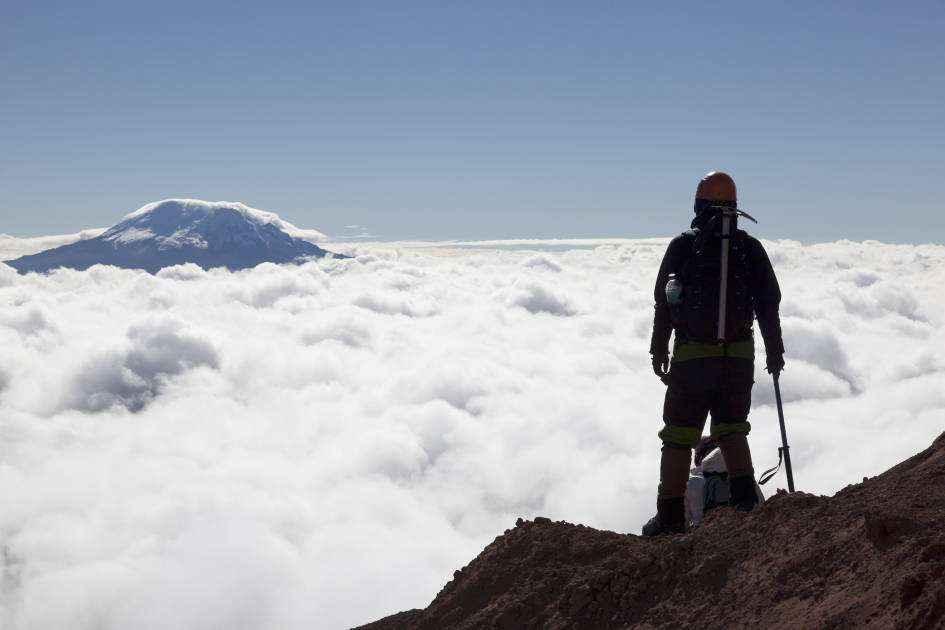
The words of sleep expert James echo. “If you’re missing out on REM sleep, your ability to regulate emotion; your ability to deal with the slings and arrows of life diminishes incredibly.”
Robbie continues: “The more sleep deprived you are, the worse your decision making becomes. If you go into a shop and you forget why you're there and what you need, and you do that during a bikepacking race, you're probably sleep deprived and that's starting to impact performance.”
One of the most important decisions Jenny Graham made before travelling the world was what sleeping kit to bring with her. She opted for lightweight and packable over warmth - a two-season sleeping bag, a roll mat and a bivvy bag.
By then you're exhausted, so making any decision other than sleeping, eating, turning your pedals was just so much; too much for your brain.
“I nailed it for the first leg; summer time through Asia,” Jenny says. “Then I decided to stay with the same sleeping equipment but wear more clothes, rather than carrying huge bags I could only use when I'm sleeping. It all made sense until you were lying down shivering.”
It was, at least in part, fatigue that stopped Graham updating her kit.
“The roll mat continually burst,” she recalls. “Even on the ride I was saying to myself 'just get another roll mat!' and the editors of my book got back to me and asked why I didn't. But my bike and my bags were just so finely tuned that I couldn't fit anything else in without having to change my system and I didn't accept that it was an issue until I got to Alaska. By then you're exhausted, so making any decision other than sleeping, eating, turning your pedals was just so much; too much for your brain. So I just got over it and I was just cold quite a lot.”
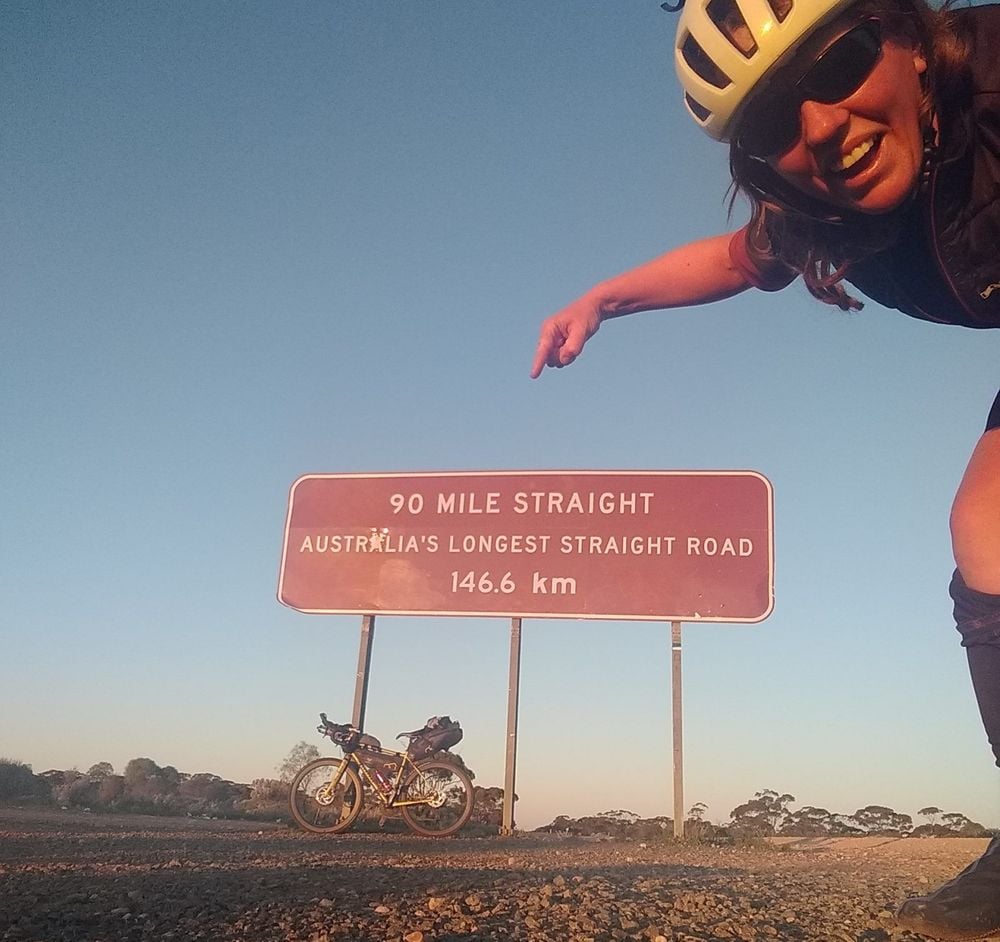
At its most extreme, sleep deprivation is known to cause hallucinations. “I’ve had really severe déjà vu,” Robbie says. “Apparently it's to do with the brain bypassing short-term memory and storing it in long-term memory when you're that sleep deprived. During a race, after every bend I went around, I recognised where I was as though I’d been there before - but only after I'd seen it.
“I've had hallucinations where I've seen rocks become faces. I remember wondering why I had never heard of a certain village because all of the rocks had carvings in them. This should be a World Heritage Site, I was thinking - but then I realised ‘no, they're just rocks'.”
I ask James Wilson about this. “In simple terms, hallucinating could be falling asleep while running," he says. "You know those itty-bitty dreams you get as you drift off? Between wakefulness and sleep is when we're very creative; like oases in the desert, especially if you’re pushing your body to extremes.”
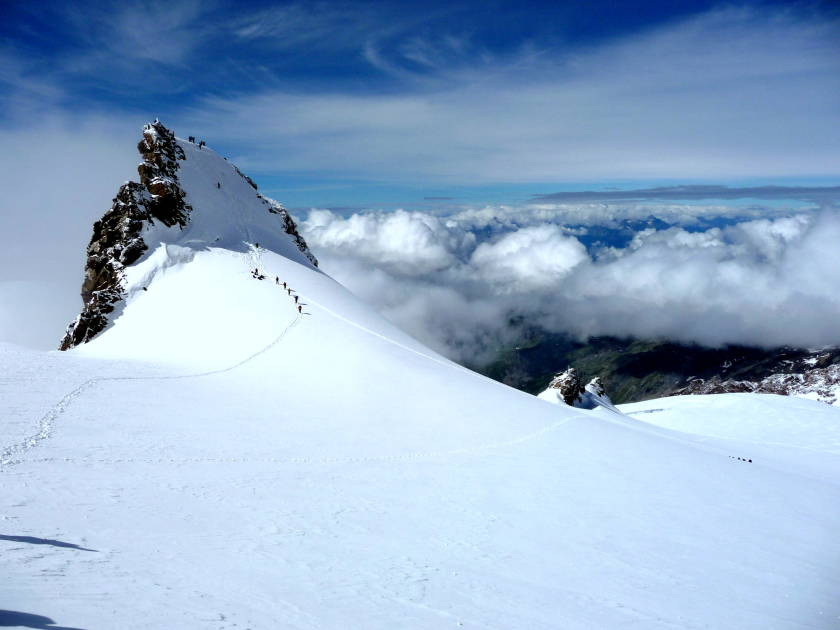
The final question is obvious: why adventure when you could be asleep?
“One of the things you're going to sacrifice for performance, with sleep deprivation, is enjoyment,” Robbie says. “But I look forward to those moments when it's dark and miserable. I want to see what I'm made of - but it's got to be a personal decision. You're earning an experience that others would have to do a lot to get. It's not a cheap experience. It's a really exclusive situation you're in, and it's very personal. In this day and age you can pay money and get a lot of stuff; but you can't buy that feeling of cycling or running through the night in an exhausted state, and getting into a beautiful moment - that's special."
Jenny has dialled her night riding back, somewhat. “I now prioritise sleep more," she says. "I think for longevity it's very important. I'm way more cautious now and those three and a half or four hours for a long event is a must for me.”
I think for longevity it's very important. I'm way more cautious now about going with minimal sleep.
But on the beauty of it, she concurs with Robbie. “There’s always that little bit of fear as the sun is going down and you need to find safety. Most people can relate to that. But once it’s down, and it’s dark out there, that’s when I feel most alive on the bike. They’re my favourite hours.
“Riding through the night with the stars and the moon out and the skyscape; I get really excited. I think back to the moon in Siberia or Asia; the big supermoon as I hit Nullarbor. That connection to nature - especially at night - is really special.”
If you’re planning an adventure then, and want your memory, decision-making, emotional reactions and physical health to be up to scratch; get a good sleep. If not, at least remember a bivvy bag - and keep an eye open for a scenic drainpipe.
Inspired? Browse our adventure holidays - and go sleep beneath the stars!

